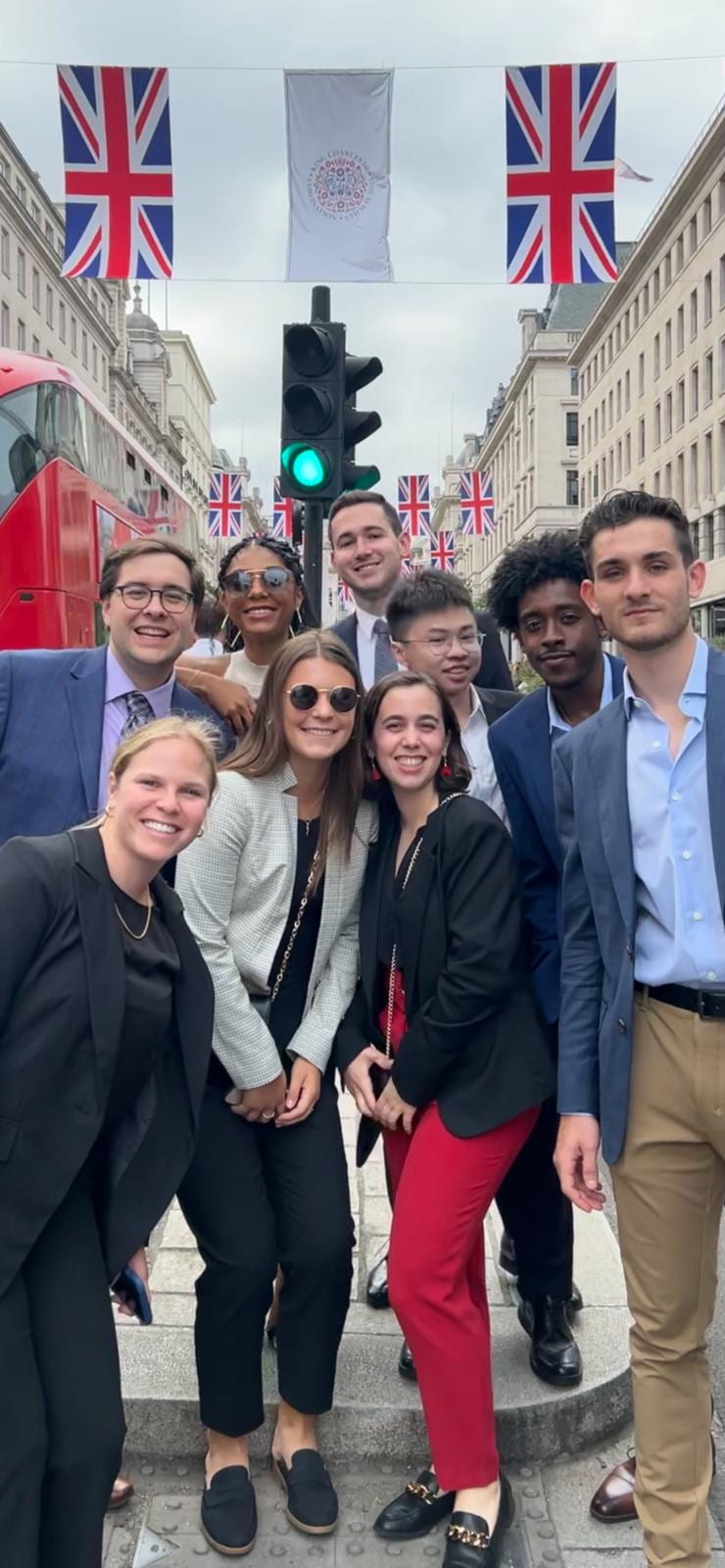Featured in the above photo: STAP UK Participants with Long Harbour speaker, Christophe de Taurines, BBA 1986.
By Cassie Nestor (MA International Economic Policy '23)
Visiting London, I was able to see the benefits and shortcomings of private and public ownership. Studying economics, I am accustomed to focusing on the most efficient outcomes. However, this program forced me to challenge what efficiency looks like, reexamine where different comparative advantages exist, and appreciate the need to be flexible in creating solutions with well-defined and explicit goals. There is an opportunity cost to every decision. In focusing on private sector ownership, England forgoes public sector ownership and its affinity towards social progress. In choosing public sector ownership, England forgoes private sector ownership and its profit seeking behavior that leads to the efficient use of resources and lower prices for consumers. Business and the State in London: Privatization, Nationalization, and Public-Private Partnerships exposed the tensions between the private and public sectors and the need to strike a balance between the two in such a way that neither progress nor profit are compromised.
During this program, I was unsure that the competing goals of the public and private sectors would ever exist in cohesion and that maybe progress and profit should not mix. This notion was solidified by our first visit to Long Harbour and our discussion with Senior Advisor Christophe de Taurines. His most striking comment was when he indicated that social change is not part of their model, and that the real estate firm is unable to profit on certain people. Businesses must meet their bottom line. While disheartening, that is a reality faced by all firms; if an activity is generating a loss, the rational choice is to discontinue operations. But what was unsaid is that discontinuing operations meant that some groups were left without access to housing and other goods. These decisions often hurt the most vulnerable in a society. If left only to the private sector, poor and disadvantaged individuals would continue to have less because they are not seen as a lucrative business opportunity.

Global Head of Infrastructure, Government and Healthcare Richard Threlfall with UK STAP group at KPMG Headquarters, Canary Wharf.
The dichotomy of the motives between the public and private sectors was illustrated by Richard Threlfall, Global Head of Infrastructure, Government, and Healthcare at KPMG. It was during this visit that we took a macro approach to major questions and events happening in the world. Unlike Taurines, who emphasized the need to make profit, Threlfall emphasized the need for larger states and larger players to cover the costs incurred by developing countries as they make important decisions to meet their development goals.
While discussed at the international level, the same is true at the national level. Governments are able to reach households and communities that are overlooked by the private sector and absorb the costs of providing goods and services to unprofitable communities in the name of social progress. However, when governments choose to engage in these activities, their balance sheets grow at an accelerated and dangerous rate.
Public ownership presents its own challenges. After talking to doctors in the National Health Service (NHS), different politicians, and members of the local community, I learned that public ownership has caused health care in England to be slightly underproductive. We became aware of inefficiencies such as the long wait times and underfunding. These issues have become so prevalent that there has been a push to privatize parts of the NHS to ensure that it is able to meet the needs of the people. There is a gap that exists between the market outcome and the social outcome. This gap leaves space for the rise of private public partnerships and their keen ability to balance the need to make profit and the need to prioritize social progress.

STAP UK 2023 participants at NHS Great Ormand Street Hospital with Dr. Daljit Hothi, Associate Medical Director.
Public private partnerships are still very experimental, with each union leading to a unique outcome and a set of lessons learned. After listening to the speakers, I have come to accept that a happy medium between private and public ownership has yet to be discovered. This course helped me realize that while the “perfect balance” between private and public ownership will vary across industry and consumer needs, we should not be discouraged from trying. It is only then that society will achieve both progress and profit.

STAP UK participants on their way to the GWU UK Alumni Networking Event.
The most beneficial aspect of this program was the knowledge received from my peers. It is easy to become siloed in one school of thought. Every tool we have to understand the world is flawed because every academic discipline emphasizes and ignores different variables that would otherwise have a significant impact on the way that we answer different questions. In staying in our traditional paradigms, we lose the possibility of asking and answering new and complex questions. However, with classmates across different schools and professional backgrounds, ideas that I would not normally come across in my classes became major topics of discussions. These questions pushed me out of my comfort zone and helped me grow intellectually. Together, my classmates and I were able to pool our knowledge and catch many of our speakers by surprise with the complexity of our questions.
Now having a slightly stronger working knowledge of different topics such as healthcare and climate change, two very salient topics in both the US and the UK, I am better equipped to answer complex questions that require unconventional solutions.
Studying international economic policy, I have been fortunate enough to be part of a program that allows me to have a foot in both the world of policy through the Elliott School of International Affairs and the world of business through GWSB. By taking classes that span across both fields, I have been able to generate a dynamic understanding of the nexus between business and politics which would have been absent if I was not encouraged to take classes and learn the importance of balancing the priorities of business executives and elected officials.
The most important lesson I will hold on to is that the private and public sectors need the other to succeed, and the success of both sectors will benefit the consumer. A strong private sector needs a strong public sector to set the rules of the road in terms of regulations and promote fair competition. A strong public sector needs a strong private sector to spur innovation, job creation, and economic growth.

The author with the River Thames in the background.
When both entities are in concert, the consumer feels empowered to participate in the economy and take responsible economic risks which will contribute to widespread prosperity. Business and the State in London is a well-designed combination of business and politics and will leave a lasting impression on my professional career.


